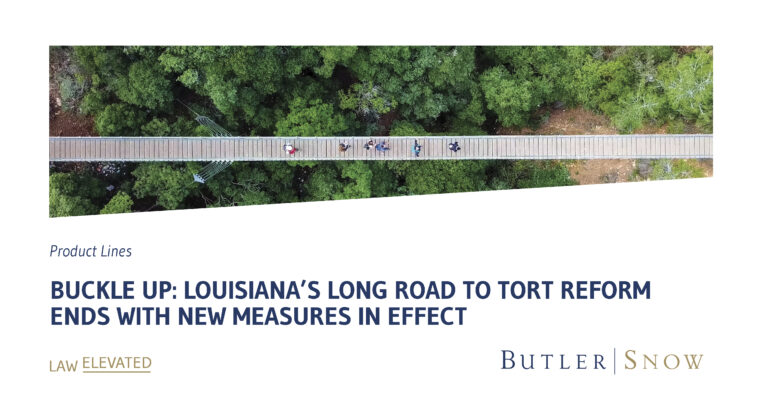With public appetite for tort reform mounting in recent years, the Louisiana legislature acted and passed the Civil Justice Reform Act of 2020 (“CJRA”). Governor John Bel Edwards signed the CJRA in 2020. The resulting changes to the Louisiana Code of Civil Procedure, Louisiana Code of Evidence and the codification of the Collateral Source Rule recently took effect. The reforms put in place by the CJRA are not as expansive as proponents of tort reform hoped for, but the key provisions of the Act will still impact litigation. Key highlights of the Act and its impacts on defense strategy are discussed in this post.
Seatbelt Gag Rule. Prior to the CJRA, Defendants were prohibited from presenting evidence of a plaintiff’s use or nonuse of a seatbelt to the jury. This prohibition limited the defendant’s ability to assert key affirmative defenses including comparative fault and failure of the plaintiff to mitigate damages. The CJRA reverses this position, allowing defendants to present evidence to jury that a plaintiff was not wearing a seatbelt at the time of the accident.
Access to Jury Trials. The CJRA lowered the minimum amount in controversy to allow for a jury trial in cases with damages from $50,000 to $10,000.[1] The previous threshold, which was the highest in the nation, allowed for a large number of cases to be tried as bench trials. Under the new law, a party seeking a jury must post the $5,000 jury bond with the clerk within sixty days of filing the jury demand.[2] Defendants evaluating the decision to request a jury should keep in mind the requirements for timely posting the jury bond. If a party makes the jury demand and fails to timely post the jury bond the right to a jury is waived.[3]
This new rule will also have significant effects on the interplay between courts of limited jurisdiction (such as city and parish courts) and district courts. City and parish courts have jurisdictional limits between $10,000 and $50,000, and there is no right to a jury trial in these courts. Now that smaller claims can be presented to a jury in district court, more cases initially filed in city court are expected to be transferred to district court. Again, deadlines are key for defendants considering transfer of a case. Defendants have limited time to request a transfer to district court, so quick action must be taken at the risk of losing the right to a jury.[4]
Collateral Source Rule. The CJRA codifies the so-called “collateral source rule,” reigning in the amounts recoverable under the prior rule.[5] A plaintiff’s recovery is limited based upon the source of payment. A plaintiff may only recover the amount paid by his health insurance or Medicare and may not recover amounts written off because of contractual arrangements between the provider and the payor. However, the judge has the discretion to award up to 40% of the difference between the amount billed and the amount paid by insurance to compensate the plaintiff for the cost of procurement.
For instance, assume a plaintiff has private health insurance and undergoes a $4,000 surgery, but the insurer’s contractual rate for the surgery is $3,000. The collateral source rule under the CJRA permits the plaintiff to recover $3,000, but the judge may increase this award to $3,400 (adding 40% of the $1,000 write-off to the award) to compensate the plaintiff for the costs incurred to procure the insurance policy. This allows the plaintiff to recover for his insurance premiums at a predetermined rate (subject to the judge’s discretion). In the course of discovery, Defendants should verify they have complete information relating to medical expenses including billing records that reflect health insurance or Medicare write-offs to accurately evaluate alleged damages.
Limitation on Mentioning Insurance. In Louisiana, a plaintiff is permitted to sue the defendant’s insurer directly, naming the insurance company as an additional defendant to the litigation. This permits plaintiffs’ attorneys to reference the insurance company defendants in front of the jury, often using “little guy versus big company” rhetoric. The CJRA attempts to limit this tactic by largely restricting the mention of insurance in front of the jury. [6] Under the new rules, juries will be informed that there is insurance applicable to the claims, but they will not learn the identity of the insurance company or the amount of coverage available.
The impact of the CJRA will likely not be fully felt for years, as it will only apply to actions arising on or after January 1, 2021. Therefore, claims subject to the new law will likely not be tried until next year. Even still, proponents of tort reform and the CJRA are hopeful that these new rules will have positive, if slow, effects at lowering insurance rates, leveling the playing field for plaintiffs and defendants, and reaching more fair and impartial verdicts in Louisiana.
[1] LA Civ. Code art. 1732 (2021).
[2] LA Civ. Code art. 1733 (2021).
[3] LA Civ. Code art. 1733(2)(a) (2021).
[4] LA Civ. Code art. 4873(1) (2021).
[5] La.R.S.§9:2800.27.
[6] LA Code Ev. 411.
